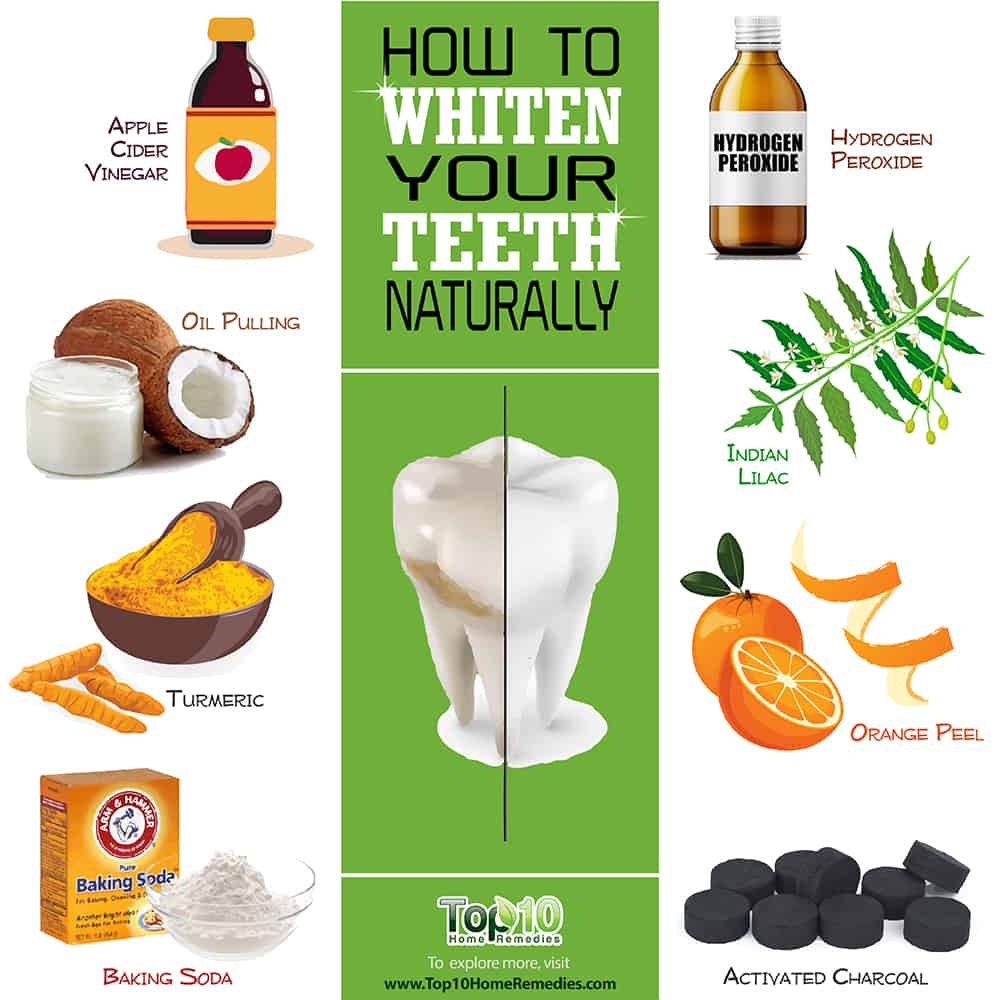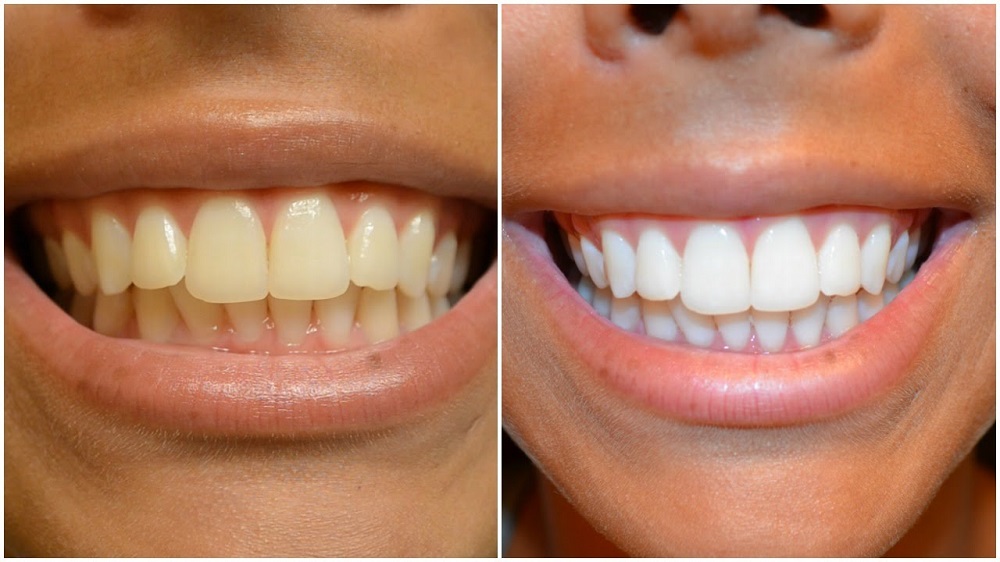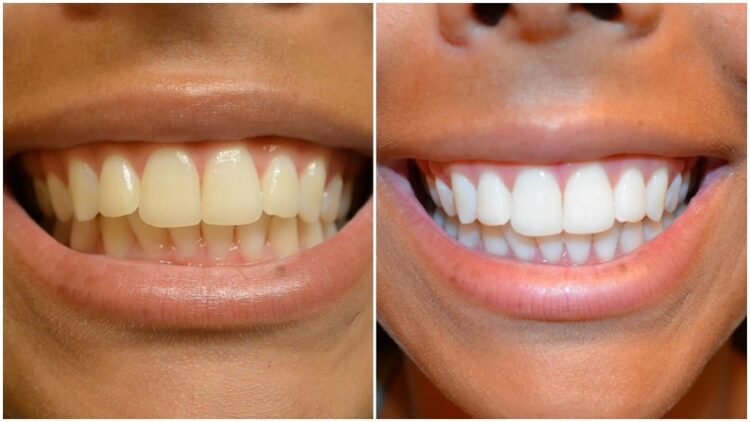
How to remove brown stains from teeth naturally? It’s a question many of us ask, seeking a brighter smile without harsh chemicals. Brown stains can be caused by various factors, from coffee and red wine to smoking and certain medications. While professional teeth whitening offers quick results, natural remedies provide a gentler approach, harnessing the power of everyday ingredients to gradually lighten teeth.
This guide delves into the science behind these natural remedies, offering practical tips and home remedies for removing stubborn brown stains. We’ll explore the best natural ingredients for whitening, discuss the importance of a healthy diet, and highlight the role of good oral hygiene in maintaining a bright smile. By understanding the causes of brown stains and incorporating these natural solutions into your routine, you can achieve a whiter, more confident smile.
Understanding Brown Stains

Brown stains on teeth can be a common concern, affecting the appearance and confidence of many individuals. These stains can range from subtle discoloration to more noticeable brown patches, and understanding their causes can help you address them effectively.
Types of Brown Stains
Brown stains on teeth can be classified into two main categories: intrinsic and extrinsic.
- Intrinsic stains originate from within the tooth structure, often due to internal factors. These stains are typically more difficult to remove and may require professional intervention.
- Extrinsic stains develop on the outer layer of the tooth enamel, primarily caused by external factors. These stains are generally easier to remove through various home remedies or professional treatments.
Causes of Brown Stains
Understanding the causes of brown stains can help you take preventive measures and address them effectively. Here are some common culprits:
Food and Beverages
Certain foods and beverages can contribute to the formation of brown stains on teeth.
- Coffee and Tea: These beverages contain tannins, which can bind to tooth enamel and create a yellow or brown discoloration.
- Red Wine: The pigments in red wine can stain teeth, particularly if consumed frequently.
- Dark-Colored Fruits and Vegetables: Foods like blueberries, blackberries, and beets contain pigments that can stain teeth.
- Sugary Drinks: Sugary drinks, including soda and sports drinks, can contribute to tooth decay and discoloration.
Tobacco Use
Tobacco products, including cigarettes, cigars, and chewing tobacco, are a major contributor to brown stains on teeth.
- Nicotine: Nicotine is a highly pigmented substance that stains teeth and can also contribute to gum disease.
- Tar: Tar is another component of tobacco smoke that can adhere to tooth enamel, creating a brown or yellow discoloration.
Medications
Certain medications can also cause brown stains on teeth, particularly those taken during childhood.
- Tetracycline Antibiotics: These antibiotics can cause a permanent gray or brown discoloration of teeth, especially when taken during tooth development.
- Antihistamines: Some antihistamines can also contribute to tooth discoloration, particularly if taken for prolonged periods.
Preventing Brown Stains
Preventing brown stains is essential for maintaining a healthy and aesthetically pleasing smile.
- Practice Good Oral Hygiene: Brushing your teeth twice a day with fluoride toothpaste and flossing daily can help remove food particles and plaque that contribute to staining.
- Limit Staining Foods and Beverages: Reducing your intake of coffee, tea, red wine, and sugary drinks can significantly minimize the risk of staining.
- Use a Straw: Drinking staining beverages through a straw can minimize contact with your teeth.
- Rinse Your Mouth: Rinsing your mouth with water after consuming staining foods or beverages can help remove pigments and reduce the risk of discoloration.
- Consider Whitening Products: Whitening toothpaste, mouthwashes, and gels can help remove surface stains and brighten your smile.
- Professional Cleanings: Regular dental checkups and cleanings can help remove stubborn stains and prevent future discoloration.
Natural Remedies for Brown Stains
Natural remedies have been used for centuries to whiten teeth and remove stains. These remedies are often derived from natural sources, such as fruits, vegetables, and minerals. While they may not be as effective as professional teeth whitening treatments, they can help to brighten your smile and improve the appearance of your teeth.
Natural Remedies and Their Mechanisms
These natural remedies work by either physically scrubbing away stains or by chemically breaking down the stain molecules. Here is a table that lists some common natural remedies for brown stains, their methods of application, frequency of use, and potential benefits and risks:
| Ingredient | Method of Application | Frequency of Use | Potential Benefits/Risks |
|---|---|---|---|
| Baking Soda | Mix baking soda with water to form a paste. Apply the paste to your teeth and brush gently for 2 minutes. Rinse thoroughly with water. | 1-2 times per week | Baking soda is a mild abrasive that can help to scrub away surface stains. However, overuse can erode tooth enamel. |
| Activated Charcoal | Mix activated charcoal powder with water to form a paste. Apply the paste to your teeth and brush gently for 2 minutes. Rinse thoroughly with water. | 1-2 times per week | Activated charcoal is known for its absorbent properties and can help to remove stains from teeth. However, it can also stain teeth and gums if not used properly. |
| Strawberries | Mash a strawberry and apply it to your teeth. Leave it on for 5 minutes, then rinse thoroughly with water. | 1-2 times per week | Strawberries contain malic acid, which can help to break down stains. However, the acid can also erode tooth enamel if used too often. |
| Apple Cider Vinegar | Dilute apple cider vinegar with water (1 part vinegar to 3 parts water). Swish the mixture around in your mouth for 1 minute, then spit it out and rinse thoroughly with water. | 1-2 times per week | Apple cider vinegar contains acetic acid, which can help to break down stains. However, the acid can also erode tooth enamel if used too often. |
Science Behind the Remedies
The science behind these natural remedies is based on their chemical properties and how they interact with teeth and stains. For example, baking soda is a mild abrasive that can help to scrub away surface stains. Activated charcoal is known for its absorbent properties and can help to remove stains from teeth. Strawberries contain malic acid, which can help to break down stains. Apple cider vinegar contains acetic acid, which can also help to break down stains.
Lifestyle Changes for Brighter Teeth
Maintaining a healthy lifestyle can significantly impact the whiteness of your teeth. By adopting a balanced diet, practicing good oral hygiene, and avoiding habits that contribute to staining, you can achieve a brighter smile.
Dietary Habits for Brighter Teeth
A balanced diet plays a crucial role in maintaining healthy teeth, including their color. Certain foods and drinks can contribute to staining, while others can help prevent it.
- Foods and drinks that can stain teeth:
- Coffee: Coffee is a notorious teeth-stainer due to its high concentration of chromogens, pigments that bind to tooth enamel.
- Tea: Similar to coffee, tea contains tannins that can stain teeth. Darker teas, like black tea, tend to have a higher concentration of tannins.
- Red wine: Red wine is rich in tannins and pigments that can contribute to tooth discoloration.
- Berries: While berries are packed with antioxidants, their pigments can also stain teeth.
- Soy sauce: Soy sauce contains a high concentration of pigments that can stain teeth.
- Curry: The turmeric in curry can contribute to yellowing of teeth.
- Beets: Beets are known for their vibrant color, which can also stain teeth.
- Foods and drinks that can help prevent staining:
- Fruits and vegetables: Fruits and vegetables, especially those rich in vitamin C, can help prevent tooth staining. Vitamin C promotes collagen production, which strengthens enamel and makes it more resistant to staining.
- Dairy products: Dairy products like milk and yogurt contain calcium, which is essential for strong teeth. Calcium can help neutralize acids in the mouth, reducing the risk of erosion and staining.
- Water: Drinking plenty of water can help rinse away food particles and acids that can contribute to staining.
Oral Hygiene Habits for Brighter Teeth
Maintaining good oral hygiene is essential for preventing staining and keeping your teeth white.
- Brush your teeth twice a day: Brushing your teeth twice a day with a fluoride toothpaste helps remove plaque and bacteria that can cause staining.
- Floss daily: Flossing removes food particles and plaque from between your teeth, where your toothbrush can’t reach.
- Use a tongue scraper: A tongue scraper removes bacteria and debris from your tongue, which can contribute to bad breath and staining.
- Visit your dentist regularly: Regular dental checkups and cleanings can help remove stains and prevent future discoloration.
When to Seek Professional Help: How To Remove Brown Stains From Teeth Naturally

While natural remedies can be effective in removing mild brown stains, they may not be sufficient for deeper, more stubborn stains. In such cases, seeking professional help is recommended.
Professional Teeth Whitening Treatments
Professional teeth whitening treatments are performed by dentists and dental hygienists using stronger bleaching agents and specialized equipment. These treatments offer faster and more dramatic results than natural remedies.
- In-Office Whitening: This involves applying a high-concentration peroxide gel to the teeth and activating it with a special light source. This treatment typically takes 1-2 hours and can lighten teeth by several shades.
- At-Home Whitening Kits: These kits are available through dentists and are customized to the patient’s needs. They involve wearing custom-made trays filled with a bleaching gel for several hours each day over a week or two.
- Over-the-Counter Whitening Products: These products, like whitening strips and toothpastes, contain lower concentrations of peroxide and may take longer to show results. They are generally less effective than professional treatments but can provide some degree of whitening.
Comparing Whitening Options, How to remove brown stains from teeth naturally
The effectiveness, cost, and potential risks of different teeth whitening options can vary.
| Treatment | Effectiveness | Cost | Potential Risks |
|---|---|---|---|
| In-Office Whitening | High | High | Tooth sensitivity, gum irritation |
| At-Home Whitening Kits (Professional) | Moderate to High | Moderate | Tooth sensitivity, gum irritation |
| Over-the-Counter Whitening Products | Low to Moderate | Low | Tooth sensitivity, gum irritation, enamel erosion |
Last Word

From baking soda to strawberries, nature offers a treasure trove of ingredients that can help you achieve a brighter smile. Remember, consistency is key when it comes to natural remedies. Incorporating these practices into your daily routine, along with a healthy diet and good oral hygiene, can lead to a noticeable improvement in your teeth’s appearance. While natural remedies can be effective, it’s essential to consult a dentist if you have concerns about persistent stains or if your teeth are sensitive. Embrace the power of nature and unlock the secret to a naturally radiant smile.
Commonly Asked Questions
Are there any side effects to using natural teeth whitening remedies?
While natural remedies are generally safe, some ingredients like baking soda can be abrasive and may cause tooth sensitivity if used too frequently. It’s important to use these remedies with moderation and consult a dentist if you experience any discomfort.
How often should I use natural teeth whitening remedies?
The frequency of use varies depending on the ingredient and your individual needs. It’s generally recommended to use natural remedies 1-2 times a week. However, it’s best to follow the specific instructions provided for each remedy.
Can natural remedies remove all types of stains?
Natural remedies can effectively lighten extrinsic stains caused by food, drinks, and smoking. However, they may not be as effective for intrinsic stains that are embedded within the tooth enamel.





